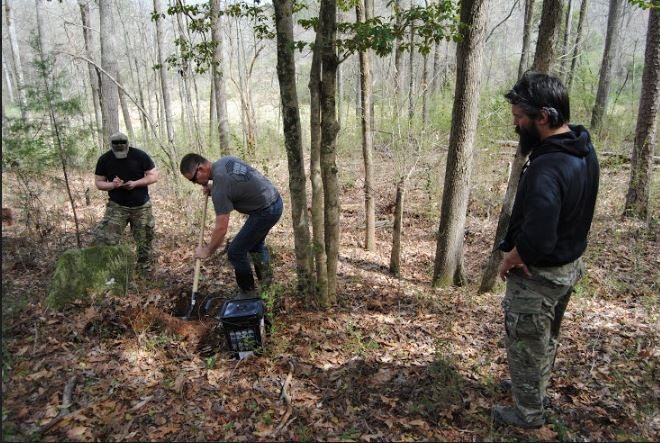It is human nature for people to attempt to take from others in times of crisis, natural or man-made disasters, or political instability. To be a complete prepper, one must look at a multitude of factors and scenarios to protect what one has put so much time and effort into to survive. In this installment, we will discuss friend or foe, security, and caches and how they relate to preventing others from obtaining what you have.
Security
Security should always be at the forefront of every plan, action, or meeting to ensure the long-term survival of any prepper. Regardless of the severity of the situation that caused you to initiate your dependability on your stored supplies, security needs to be there.
It is easy to be task saturated in preparing food and supplies that one can easily forget the need for protection from the unprepared when the panic of hunger and desperation sets in. There are many layers of security and they may vary depending on your location, number of people in your group, and the items available to protect yourself.
One of the main principles of security is to be able to identify a potential threat before it gets too close to you. Outer perimeter watches, achieving a higher elevation with a good line of site on the avenues of approach, or simply keeping others at a distance so you can react appropriately, can achieve this. The more time you have to mobilize is always a good thing! Another must is to emplace trusted people in over watch positions while you are meeting with others or recovering supplies to provide cover for your escape if things go bad.
Friend or Foe
Whether you are prepping with a group or on your own, it is highly likely that you will encounter others that are in need of supplies or help. This situation will require the prepared to be able to determine if the people in need are a potential friend or foe. Depending on the overall situation, one might avoid other people entirely. Other situations one might rely on barter and trade concept to get through tough times. Either way, your ability to determine a friend or foe will ensure your long-term survival.
Body language is one way to get a feel for someone. Their overall demeanor can help you determine to take precautions immediately or in anticipation. Another way is to listen to your senses. It is amazing when your instincts cause the hair on the back of your neck to stand up which is a sure sign of something about to go wrong.
Survival situations will require you to take advice from others in your group to help in determining the difference as well. The insight of others you trust will make this task easier so you can hopefully avoid bad situations altogether. In addition, the more distance you have between your supplies and potential friend or foe can greatly affect the outcome of the situation.
If you have to break contact from an unexpected encounter, you can alter your route back to your hold up site in case of pursuit or avoid the potential of exposing your location all together.
Caches
The use of caches is an integral part of prepping and survival. It does not matter if you plan to travel to a different location or want to stay put, caches placed in strategic locations will serve you well when the time comes. The use of caches ensure you don’t “keep all of your eggs in one basket” and lose everything you worked so hard for due to robbery, fire, relocation, etc.
Caches serve well placed below ground, above ground, hidden in rocks and trees, etc. Remember, if you bury your cache you need to have the tools to dig it up if the soil has become hard.
There are many thoughts on what to actually put in a cache. I like to pack them all with the same supplies, if possible, so I can replenish what is needed at any time and not have to worry about remembering what is in each one at each location. The container you choose to store your important items in needs to be researched carefully to ensure it is water tight, rust proof, and can stand up to the elements.
Caches need to be refreshed from time to time depending on the “shelf life” of the items stored. The final thing to take into consideration is the choices to just put all of the items in the cache or have them in a pack to just recover and go. There is a bad day on the rise when you are have to move out carrying your supplies in your arms when you could’ve had a backpack instead!
In conclusion, there are multitudes of considerations to make when it comes to preparing for your long-term survival. Remember that if others are able to take what you have easily then you might as well not even put the effort into it in the first place.
The implementation of security into prepping is just as important, if not more, then the procurement of supplies. The ability to determine friend or foe can be the difference between survivor and casualty. The determination of what to put into your caches and where to put them will prevent you from losing everything in one event and ensure your long-term survival. By putting some serious thoughts into security, determining friend or foe, and caches will only guarantee your chances at surviving any situation for its entirety.
Thanks for joining us in our endeavor to assist you in preparing for the worst. Remember, these articles are not the final solution for prepping and survival but serve as additional tools for you to consider in your quest to overcome adversity. Stay tuned for further installments.
by retired Special Forces veteran Jay Paisley

